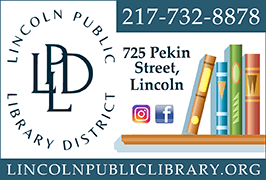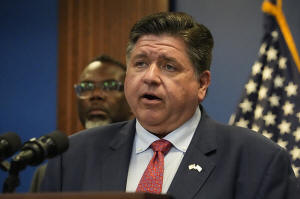Trump says he's set to order federal intervention in Chicago and
Baltimore, despite local opposition
[September 03, 2025]
By WILL WEISSERT and SOPHIA TAREEN
WASHINGTON (AP) — President Donald Trump said Tuesday that he's ready to
order federal authorities to mobilize and combat crime in Chicago and
Baltimore, despite staunch opposition from elected leaders and many
residents in both cities.
Asked by reporters in the Oval Office about sending National Guard
troops to the nation's third-largest city, Trump said, “We’re going in,”
but added, “I didn’t say when.”
“I have an obligation," the president said. ”This isn't a political
thing."
Illinois Gov. JB Pritzker, a potential 2028 Democratic presidential
contender, scoffed at the notion of sending military troops and federal
agents into Chicago, reiterating Tuesday that federal intervention was
not required or wanted.
Local officials in Baltimore have joined Democratic Maryland Gov. Wes
Moore in similarly opposing federal law enforcement intervention.
Trump has already sent National Guard troops into Los Angeles and
Washington, where he's also federalized the police force. He has said he
plans similar moves in other Democrat-run cities even as a federal judge
on Tuesday deemed the California deployment illegal.

Trump criticizes leaders in Chicago
The president praised Washington Mayor Muriel Bowser for working with
federal forces, but repeated his criticism of Pritzker and Chicago Mayor
Brandon Johnson, a Democrat. Trump said he’d love to have Pritzker call
and say, “Send in the troops” — even though the two-term governor has
repeatedly said he won’t be doing that.
He said if Pritzker would "call me up, I would love to do it,” Trump
said. “Now, we’re going to do it anyway. We have the right to do it.
Because I have an obligation to protect this country and that includes
Baltimore.”
He added, “Baltimore’s a very unsafe place”
Pritzker deemed Trump’s comments to call him for help as “unhinged.” The
two have been locked in an escalating war of words for days as Trump
called Chicago “the world's most dangerous city” earlier Tuesday.
“No, I will not call the president asking him to send troops to
Chicago,” Pritzker said Tuesday at a news conference with Johnson and
other leaders. “I’ve made that clear already.”
Illinois notified of federal plan
The state received its first contact about federal intervention on
Saturday when the head of the Illinois State Police got a call from
Gregory Bovino, chief of the Border Patrol’s El Centro, California,
sector, saying immigration agents would come to Chicago, according to
Pritzker. The governor said no further details were offered.
Pritzker urged the public not to let the presence of federal agents
spark tensions in the city but asked residents to look out for
neighbors, and to film interactions with federal agents and share them
publicly.
“Authoritarians thrive on your silence,” he said. “Be loud for America.”

Chicago has been bracing for the expanded federal presence, with
activists, pastors and schools prepared for the deluge of national
attention.
Even without knowing exactly what is coming, the city’s organized
activist network began circulating protest schedules, vowing to
demonstrate within hours of troops or federal agents arriving.
The measures are familiar in a city that has long tried to counteract
Trump's bid to deport more people, including adding more staff at a
hotline to report immigration arrests.
Dozens of pastors write a letter to Trump Tuesday saying the focus
should instead be on underfunded schools and unemployment.
“To the faithful of Chicago, I say this: prepare your hearts for
resistance,” the letter said.
[to top of second column]
|


Crime in Chicago
Johnson said violence in the city stems from guns on the streets
that are trafficked to Illinois from neighboring states, including
Republican-led Indiana.
“Chicago will continue to have a violence problem as long as red
states continue to have a gun problem,” Johnson said.
Echoing a trend in other major U.S. cities, Chicago’s violent crime
has dropped significantly overall, though it remains a persistent
issue in parts of the city.
Recently, the Trump administration has renewed interest in the
city’s daily crime log, including using a spate of shootings during
the Labor Day weekend as justification for increased military
presence.
Chicago’s homicide rate is 21.7 per 100,000 residents in 2024,
according to analysis of federal crime data by the Rochester
Institute of Technology. It cites seven other major U.S. cities —
St. Louis, New Orleans, Detroit, Washington, D.C., Atlanta,
Indianapolis and Richmond, Virginia — with higher rates.
Chicago reported 573 homicides in 2024, the most of any U.S. city
that year. But violent crime dropped significantly in the first half
of the year, representing the steepest decline in over a decade,
according to city data. Shootings and homicides were down more than
30% in the first half of 2025 compared to the same time last year.
Illinois Attorney General Kwame Raoul has said the city and state
will sue once the federal intervention begins.

Trump says intervention in Baltimore is necessary
Trump's comments about Baltimore being included in his obligation to
protect the country follows local officials in that city and Moore
opposing federal law enforcement intervention.
Moore spokesman David Turner said, “While we try to decipher exactly
what the President meant today, the Governor has been consistently
clear: The use of the National Guard for municipal policing is
theatrical and not sustainable."
Baltimore Mayor Brandon Scott listed some of the city’s recent
accomplishments in curbing gun violence. Scott has repeatedly
accused the president of using racist rhetoric and targeting
Black-led cities, like Baltimore and Chicago.
“Here’s the reality in Baltimore,” Scott wrote on X, noting that
Baltimore homicides have reached historic lows amid sustained
declines including the lowest number of homicides on record for the
month of August.
Trump said his efforts in Washington have ensured it “is now a safe
zone. We have no crime.”
The White House announced separately Tuesday that more than 1,650
people have been arrested since the Trump administration first
mobilized federal officials on Aug. 7.
“This was a beautiful thing that happened in Washington," Trump said
"because we showed that it could be done.”
___
Associated Press writers Lea Skene in Baltimore and Brian Witte in
Annapolis, Maryland, contributed to this report. Tareen reported
from Chicago.
All contents © copyright 2025 Associated Press. All rights reserved
 |